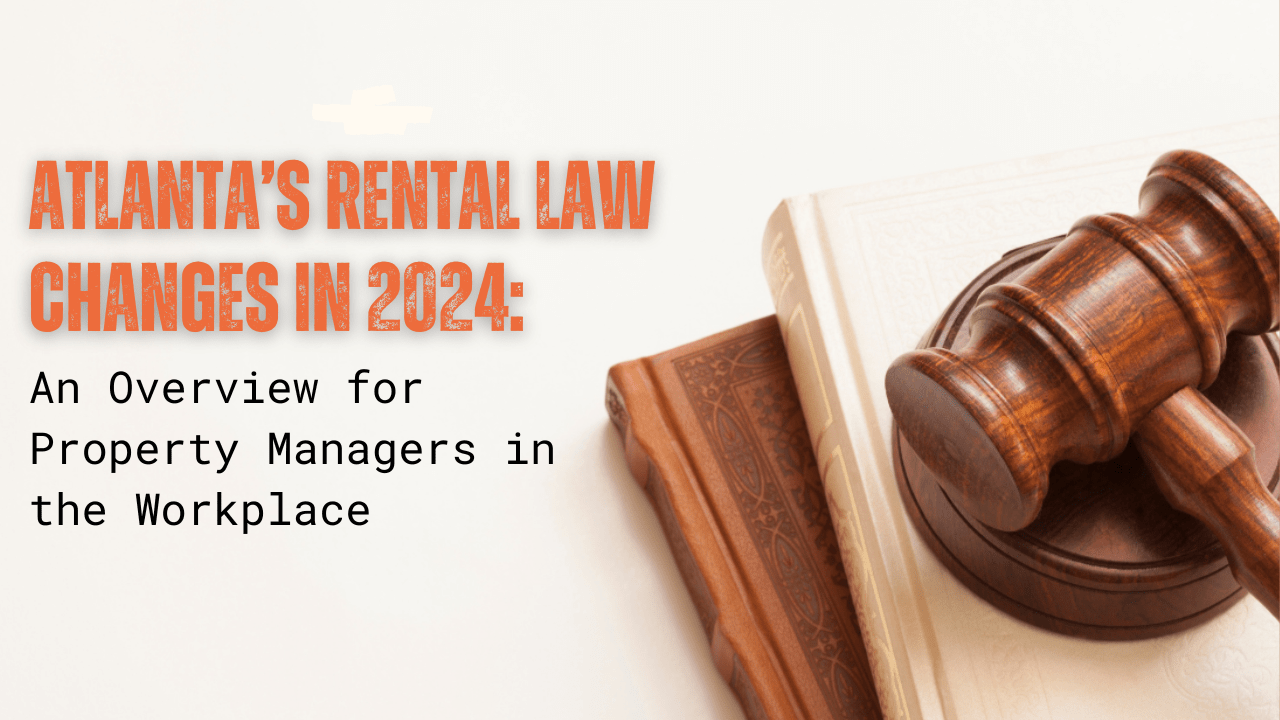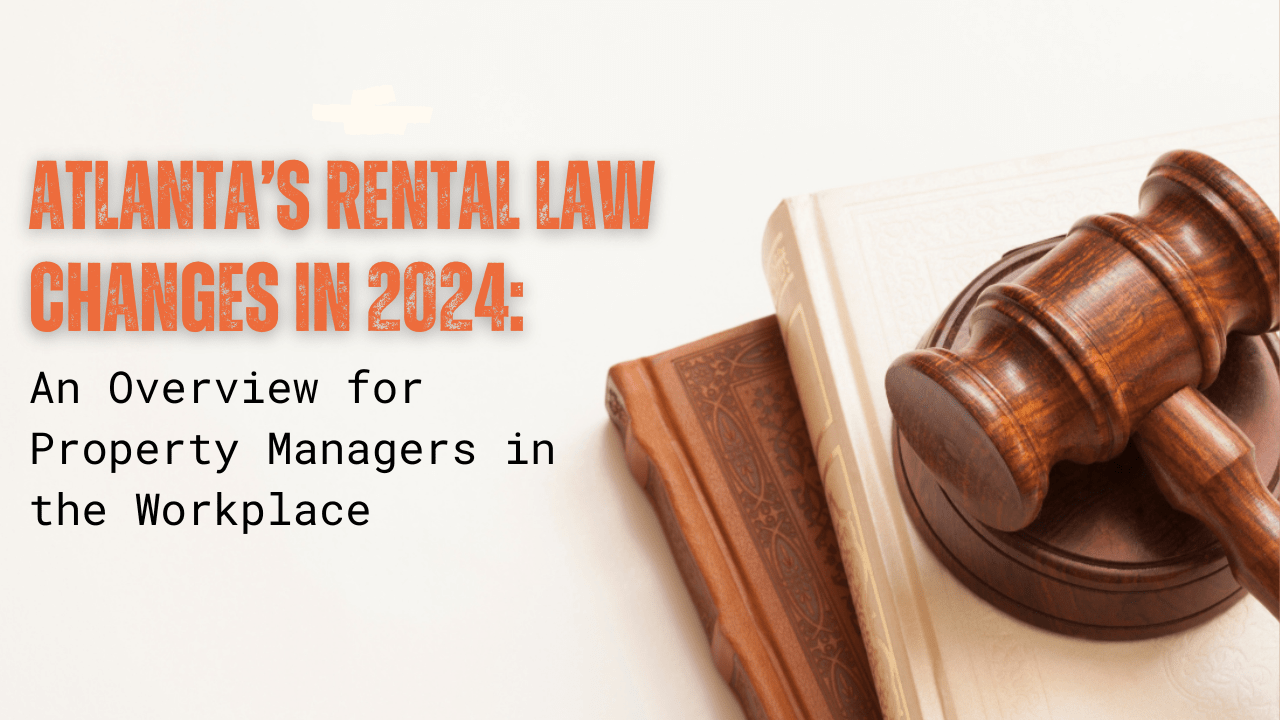
Georgia has always been a fairly landlord-friendly state. We don’t have rent control here, and the rules around evictions are pretty easy to work with and won’t take too much time or cost too much money, especially compared to other states.
That doesn’t mean we don’t have laws in place that govern how you rent out your property. In Atlanta, you have to give your tenants at least 60 days of notice before you raise the rent more than five percent, when they’ve been living in your property for more than 12 months. There are security deposit requirements, lease disclosures that are necessary, and a general expectation of privacy that tenants have when they’re renting your home which prevents you from showing up unannounced or making changes to the lease agreement mid-tenancy.
A few new laws have shown up in 2024, and we want to talk about them today.
Safe at Home Act
One of the most important new laws to affect your rental property and your relationship with your tenants is the Safe at Home Act, which went into effect on July 1, 2024. There are several specific and equally important components to this Georgia law: habitability and security deposits as well as grace periods and evictions.
Habitability and Safe at Home Act
This law requires that all rental properties in Atlanta and throughout Georgia meet the local and state health and safety standards. The homes you rent out must be fit for habitation. You can’t just provide a habitable home and then leave it up to the tenants, either. You are required to maintain habitability standards throughout the lease period.
Landlords in Atlanta have always been expected to provide a safe and habitable rental home, but there were never any actual standards in place that pointed to what was required. Before this law, Georgia was one of only three states that didn’t have an implied warranty of habitability for rental homes. This new law, however, now mandates specific requirements and gives the state of Georgia more power in enforcing those habitability standards.
You’ll need to ensure your property provides functional plumbing, electrical systems, hot water, heating, and cooling. You have to make sure your roof is free from leaks and pests are not tolerated in Atlanta rental properties. Mold must be remediated as well.
You now have a Duty of Habitability, and that means you’ll want to pay extra attention to maintenance at your Atlanta rental properties. This is a good time to take proactive measures to ensure your properties meet these standards. Conduct routine inspections so you know where there may be problems. Address repair requests from your tenants promptly, and always make sure you’re staying up to date on local building codes. This will minimize potential issues. You don’t want to find yourself brought to court by a tenant who claims they cannot live in the home they’re renting from you because repairs are not being made or mold is creeping across the walls.
Security Deposits and Safe at Home Act
The Safe at Home Act also limited the amount of a security deposit that can be collected ahead of a lease term. You’re now restricted to collecting the equivalent of two months’ rent as a security deposit. This is a big change for rental property owners in Georgia, who previously faced no limits on what could be collected ahead of a move-in. There’s really not much to be too upset about, however. It would be difficult to find a tenant willing to pay more than that as a security deposit, anyway. However, pet fees and any advanced rent (think first and last month’s rent) must be included in the total security deposit amount, so this might have an impact on how much you charge as a deposit.
This security deposit limit is good for tenants, who can now rent any home that they’re approved for without having to worry about the cash they’ll need upfront to move in. It will never be more than the equivalent of two months of the rent they’ll be paying.
For landlords, this makes tenant screening even more important. You want to know you’re renting your Atlanta property to a reliable tenant who can be trusted to pay rent on time, take care of your property, and follow the terms of the lease agreement.
Evictions and Safe at Home Act
There’s now a grace period that tenants are entitled to if rent is not paid on the first day that it’s due. According to this new law, tenants have a three-day grace period to come up with the rent before you can begin an eviction. When those three days come and go and you decide you want to move forward with an eviction, you’re required to give a clear written notice to your tenants, which outlines the reasons why you’re evicting them. This is the tenant’s “right to cure.”
Another part of the eviction component to this law is that self-help evictions have had their definition updated. While you were never permitted to change the locks or shut off the utilities in order to get a tenant to move out of your property, you’re now not allowed to turn off the air conditioning or the cooling in order to force an eviction.
Before proceeding with an eviction in Atlanta, ensure you have a valid legal reason. Those reasons include non-payment of rent, a violation of the lease terms, illegal activity at your property, or the expiry of a lease without renewal, wherein the tenant simply does not leave.
As we have discussed, you’ll need to serve a notice before you take any legal steps towards eviction. After that, you can file a dispossessory affidavit with the local court to start the eviction process. This step involves paying a filing fee and providing evidence supporting the eviction claim. Once the lawsuit is filed, your tenants will have seven days to respond to it. If they do not respond, the court may issue a default judgment in your favor, and then the tenants will be ordered to move out. But, if the tenant contests, a court hearing will be scheduled, where both parties can present their case.
We always recommend you consult with an attorney or an Atlanta property manager before you move forward with an eviction. As you can see, the laws are always changing, and it’s not always easy to keep up.
The Safe at Home Act helps you as a rental property owner because it establishes minimum habitable conditions, leaving you with some guidelines to work with when it comes to maintaining your property. You’ll reduce ambiguity and potential disputes with tenants regarding the state of the rental property. You have an opportunity to address repair issues promptly and set a good example for how rental homes should be maintained.
Atlanta landlords will want to review any existing residential lease agreements that might have been written or renewed on or after this important new law went into effect (July 1, 2024). You may need to update some of the language that’s in your lease, especially around security deposits.
This also serves as a good reminder to document all maintenance requests from tenants and to keep records of how you responded and what was done.
Squatters and Atlanta Rental Property Laws
Adverse possession laws in Georgia were also adjusted in favor of property owners in 2024, giving landlords more power to remove squatters or people with no rights to the property from the premises. To make an adverse possession claim, squatters have to prove that they have been living in the property for at least 20 years. You can now remove illegal occupants of your property faster, thanks to HB1017. The Georgia Squatter Reform Act imposes trespassing charges on squatters and allows property owners to fine those squatters for back rent. Trespassers can be evicted within three days of a police report being filed.
Updated HOA Laws
 If you’re renting out a property in an HOA, you now have more time to address violations before the association takes legal action against you. To summarize what this bill means:
If you’re renting out a property in an HOA, you now have more time to address violations before the association takes legal action against you. To summarize what this bill means:
- The HOA must inform homeowners in writing of any violations.
- Homeowners get to retain their voting rights even when they have been cited for violations.
Let’s say you (or your tenant) paints the property a color that’s not approved by the HOA, or you put up a fence without getting prior approval. You’ll have 10 days after you receive a notice in writing that you’ve breached a covenant to come into compliance. The HOA cannot pursue any legal remedies against you until that notice period has passed.
These are the highlights of the latest bills to become law in Atlanta and throughout Georgia. As we said earlier, this remains a landlord-friendly state. These laws that were recently passed are not only to protect tenants, but also to support landlords as they rent out their properties in Atlanta.
If you have any questions or need any help, please contact Property Services of Atlanta for more information by calling (770) 426-1150. We’d be happy to serve as your resource.

 Owner Portal
Owner Portal




